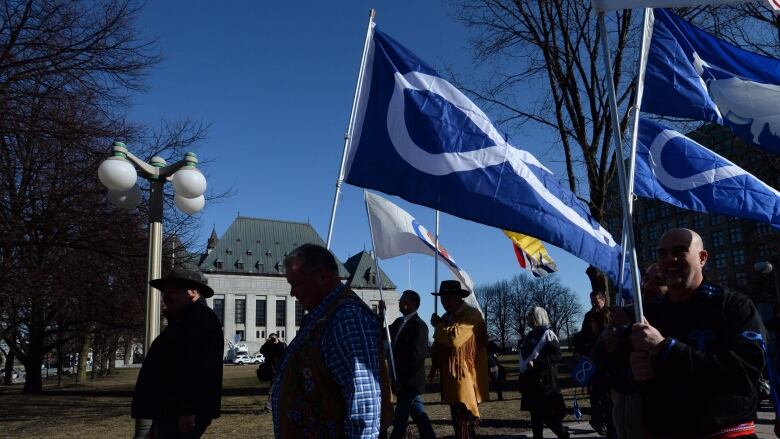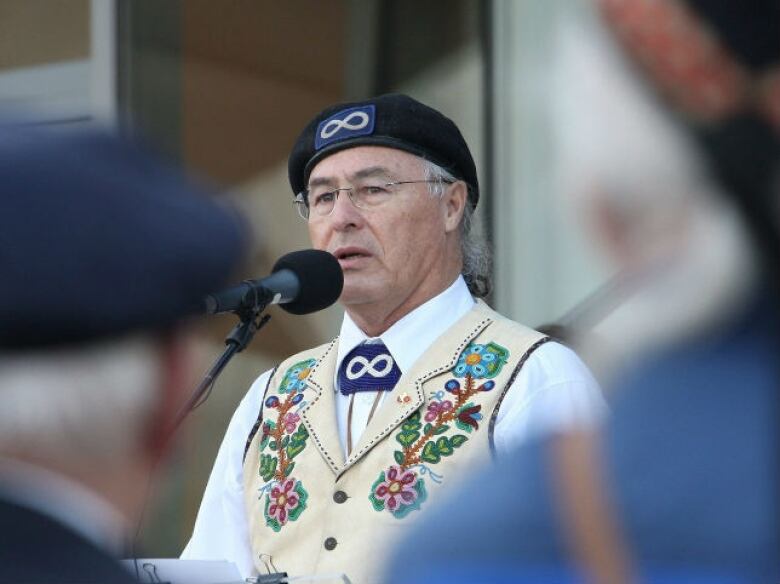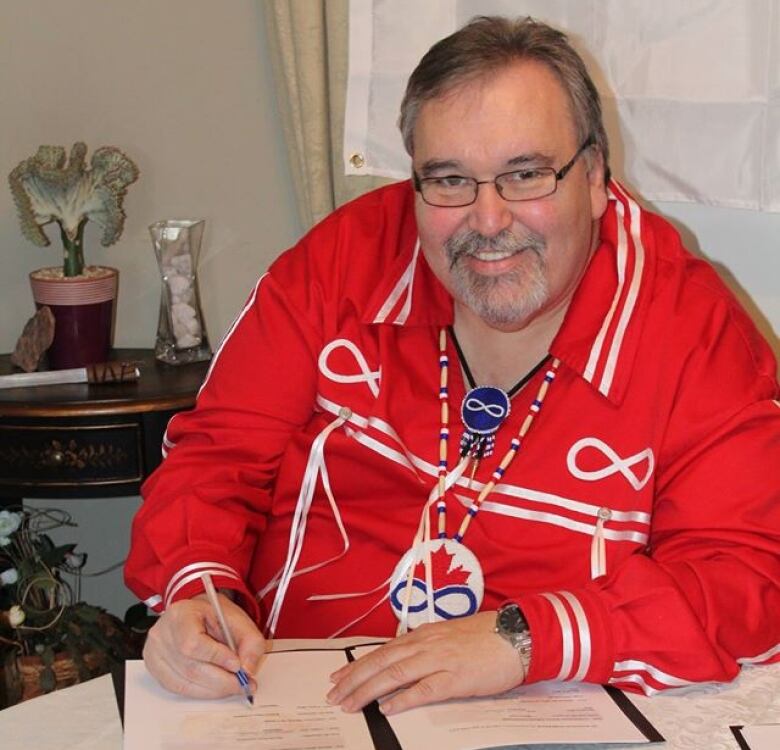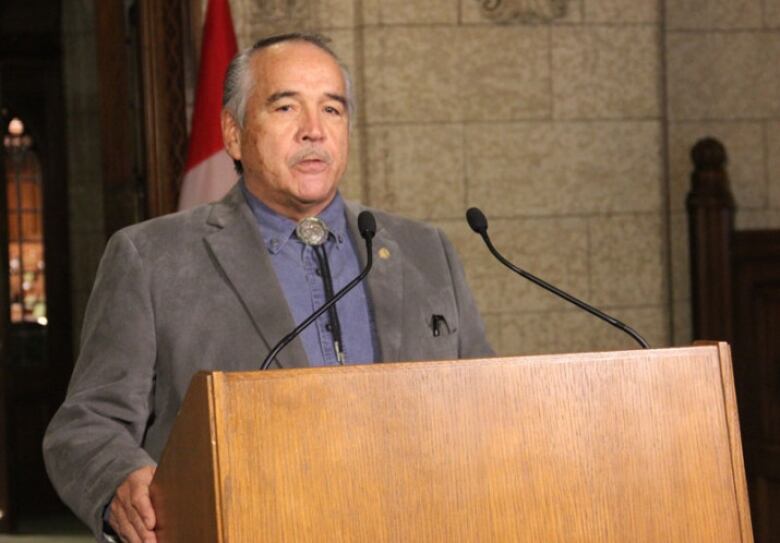Mtis infighting follows historic Daniels ruling by Supreme Court
Mtis groups vie for recognition from Ottawa while battling over who is, and is not, Mtis

Infighting betweenMtisgroups is threatening to underminea Supreme Court of Canada ruling that opened the door tobetter programs and services for Aboriginal people.
In April, the high court ruled thatMtisand non-status Indians are "Indians" under the Constitution and they fall under federal, not provincial,jurisdiction.That means that when it comes to negotiating certain rights, or new programs and services, they should knock on Ottawa's door.
The Daniels vs. Canadaruling had many hoping that some of the country's most disadvantaged people were on the verge of turning a corner, but infighting amongMtis groups over which peopledo, or do not, qualifyas Mtisand can therefore have a seat at the government's table to discuss programs andservicesis eroding that hope.
- What a landmark ruling means and doesn't for Mtis, non-status Indians
- Supreme Court ruling gives Metis a seat at the table with Ottawa
- Unanimous ruling says Ottawa has jurisdiction over all indigenous people
Although the federal government does not decide who can legitimately represent themselves asMtis, some say theway the government has conducted its consultations with various groupsis not helping to clear up the issue.
"The government has a lot of power, at least symbolically, to say we're going to sit with these groups, rather than these groups, and then this creates divisions and conflicts," said Sebastien Malette, a professor of law and legal studies at Carleton University and an expert in Aboriginal law.
It is difficult to prevent bogus groups from coming forward and making claims, but not hard to develop a process to weed them out, he added.
In the Daniels ruling, the Supreme Court did not define what it means to qualify asMtis ornon-status Indians, saying it would have to be decided on a case by case basis. But there are some generally agreedupon criteria, including ancestry and community ties.

Malette saidthe federal government needsto clear up the infighting by crafting a process that can test the legitimacy of a group's claim to beMtis while remaining broad enough to accommodate the diversity of theMtispeople.
A lot is at stake for those groups seeking a seat at the federal government's tableincluding land claims, the right to self-government, harvesting rights,health, education and cultural programs.
But so far it appears as if only a couple oflong-standing groups havemet that standard: the Indigenous Peoples Assembly of Canada (formerly the Congress of Aboriginal Peoples) and the Mtis National Council. And it is the MNC that seems to be making the most progress in its efforts to get the ear of the government.
Unclear how to obtainlegitimateMtis status
The MtisFederation of Canada, however, is a group that was formed three years ago to represent Mtisin all parts of the country. Robert Pilon, the MFC's president, saidrequests for a meeting with the minister of Indigenous affairs have been answered by a meeting with senior officials instead.
Pilonsaid those officialsrepeatedly asked about the legitimacy of theMtisFederation, despite it having been an intervener in theDanielscase.
"It didn't amount to very much," said Pilon. "They said you haven't been around long enough even though most people on our board, on average, have been involved in Mtis politics anywhere from 15 to 40 years."

Pilon points the finger at the Mtis National Council, headed by Clement Chartier, for excluding Mtis east of Ontario from what Chartier calls the "MtisNation."Disillusionment with that western-based ideology led to the creation of Pilon's group.
"They're trying to rewrite history, theMtisNational Council the true history of theMtisis very inclusive," saidPilon.
"If you want to have a true representation ofMtisin Canada, they got to make sure allMtisare at the table," saidPilon. "Not just pick and choose just because one group has been around longer."
For his part, Chartier saidother groups are welcome to their own negotiations, he just doesn't want them at the table with him and theMtisNational Council.
"The government would be foolish to take a table with the Mtis Nation and expand it to who knows what," said Chartier.
Special envoy, new process needed
Dwight Dorey, national chief of the Indigenous Peoples Assembly of Canada, said hesuggested to Bennett that a special envoy be appointed to sort out the issues, someone like former Truth and Reconciliation Commissioner Murray Sinclair, who isnow a senator.
"She said she would take it to the 'centre,' whatever that means," Dorey said. The minister's office did not reply to requests for clarification, but the Prime Minister's Office is often referred to as the centre.
"This government talks about a new relationship, a new partnership, so let's do it fairly, equally and transparently," Dorey said.

In a statement, the minister's office said, "There is much work to be done" and that it will require "distinct and innovative approaches."
The government did not specify what it would do,if anything,to calm tensions or ensure an inclusive process.
Malette, the Aboriginal law expert,said things can still get back on track.
"Evidence and reason and common sense I hope will prevail in showing that a Mtis diversity shouldn't be seen as threatening one actor against the others," he said.












_(720p).jpg)


 OFFICIAL HD MUSIC VIDEO.jpg)
.jpg)



























































































